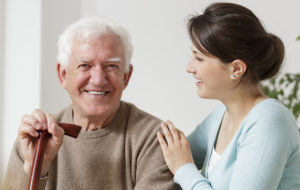 A stroke can rob people of many physical and mental abilities.
A stroke can rob people of many physical and mental abilities.
Depending upon the extent of the brain damage caused by the stroke, people may have trouble walking, speaking or engaging in daily activities, such as cooking, washing dishes and/or driving. Rehabilitation is possible and the extent of its success is highly individual. However, one thing is true for everyone. Physical and mental exercise can improve stroke care, increasing the brain’s ability to respond to various signals from the body.
Remember that recovery is a lifelong process. Support groups are important to your loved one as he takes on a life of rehabilitation. Talking to others and sharing experiences will bolster your loved one’s courage and help avoid feelings of isolation. Stroke survivors are resilient, and communicating with each other is a key part of recovery. Your loved one may be angry, anxious or depressed after suffering a stroke. Fellow survivors can help your loved one to walk through those stages of recovery.
Although it is never a good idea to generalize on what recovery can be achieved by any one individual, the National Stroke Association reports the following statistics on stroke recovery:
- 10 percent of stroke survivors recover almost completely.
- 25 percent recover with minor impairments.
- 40 percent experience moderate to severe impairments, requiring special care.
- 10 percent require care in a nursing home or other long-term care facility.
- 15 percent die shortly after the stroke.
You can help your loved one regain skills after a stroke in the following ways:
Physical Exercises
Arm, finger and leg exercises can help to regain movement, especially those needed to drive. Your rehabilitation center, physical therapist and/or occupational therapist probably practiced these exercises with your loved one while in rehab. It is important to continue these exercises regularly at home and to be patient. Your loved one is bound to get discouraged. Remind him of the goals that have been set, and provide encouragement to continue with the exercises.
Speech Exercises
If the stroke affected your loved one’s speech, he will continue to work with a speech and language therapist. You can support this work at home by continuing the exercises. If speech has been significantly interrupted, you will need to find new ways to communicate. Some words may be easy for your loved one to say, while others may be impossible for him to recall or articulate. Develop sign language and other cues so you can communicate. You want to avoid a situation where your loved one feels distraught or discouraged because you cannot speak to one another.
A stroke may cause aphasia, which is difficulty expressing oneself verbally, trouble understanding speech and/or difficulty with reading and writing. There are different types of aphasia that will require different therapies to regain speech:
- Expressive aphasia—You know what you want to say, but cannot find the words you need.
- Receptive aphasia—You hear someone talking or see the printed page but cannot make sense of the words.
People with anomic or amnesia aphasia, the least severe form of aphasia, have difficulty in using the right names for objects, people, places or events.
Global aphasia is the most severe, caused by widespread damage to the language areas of the brain. Stroke survivors with global aphasia cannot speak or understand speech, nor can they read or write.
Mental Exercises
A stroke may affect memory, and some of that can be retrained. It is possible to improve memory loss over time. The most important reason to engage your loved one in mental exercises is to prevent another stroke. Some of the most effective exercises include:
- Learn a new skill or hobby—Learn to knit, paint or do yoga. Hobbies that exercise both the body and the mind are most beneficial for stroke survivors.
- Exercise—Believe it or not, one of the most beneficial mental exercises is physical exercise. Something as simple as walking can increase the flow of blood and oxygen to the brain, improving memory and cognition.
Stroke home care and recovery is not an easy road, but there is a lot of support available to you and your loved one. Rely on the therapists you met in rehab for ongoing support, and call your loved one’s primary care physician if you need help. While your family may be able to provide some care during recovery, patients with more comprehensive or full-time needs should look at a home care provider for help.
Home Care Assistance Mesa has a Transition Home Package designed specifically for the unique needs of post-hospitalization patients. It offers a personalized discharge and care plan, as well as flexible schedules to accommodate changing needs. Caregivers are matched specifically to the patient and ongoing care management.
Contact Amanda Butas, your Mesa client care manager, at (480) 699-4899 to see how our caregivers can help your loved one thrive. You also can visit us at our new office, 2031 N. Power Road, Suite 103, located near Bed Bath and Beyond, at Power and McKellips roads.

